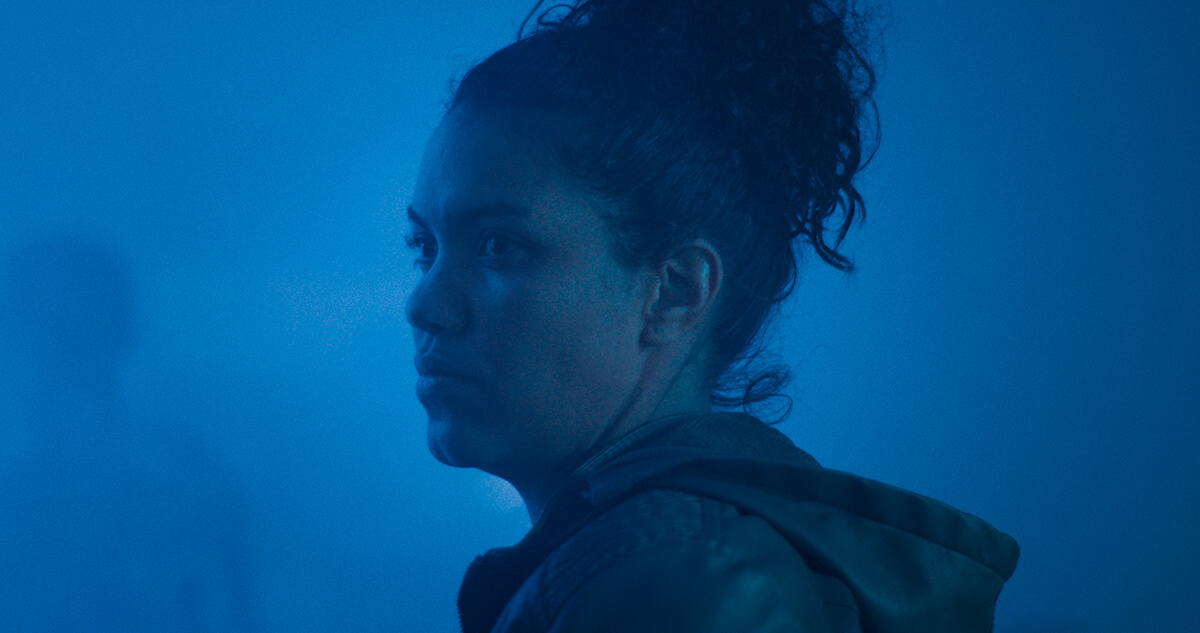The Brazilian film “Dry Ground Burning” treats its characters and location — the slum of Sol Nascente, outside the country’s capital Brasilia — as the stuff of myth while retaining a documentary edge. Its non-professional actors play characters based on their own experiences, with a story based around sisters Léa (Léa Alves) and Chitara (Joana Darc Furtado). The degree of fictionalization remains ambiguous. A former professional soccer player who grew up in the Brasilia suburb of Ceilândia, co-director Adirley Queirós spun variations on Afrofuturism in his last two features, “White Out, Black In” and “Once Upon a Time in Brasilia.”
“Dry Ground Burning” drops the element of science fiction, but it still looks like a genre film. It includes images whose content is perfectly banal but aren’t shot that way: a woman standing on a roof is bathed in orange light, while blue thunderclouds crackle in the distance. Sol Nascente resembles George Miller’s vision of post-apocalyptic Australia in his “Mad Max” series. “Dry Ground Burning” makes terrific use of a hip-hop soundtrack, including a live performance of a song celebrating Chitara. It delivers a hopeful version of Black, queer women’s rebellion, yet it doesn’t hind glimpses of a grimmer reality beyond the film.
Upon release from jail, Léa finds a new way to make money. Chitara has set up a sophisticated practice siphoning gasoline from underground oil refineries. Tapping into the pipes, they lead an all-female gang, profiting from natural resources that the state would rather claim for itself. Meanwhile, the rise of Jair Bolsonaro’s regime lurks. One of Chitara’s friends, Andreia (Andreia Viera), runs for the position of Sol Nascente’s district deputy under the auspices of the Prison People’s Party. At night, she rides on the back of a motorcycle taxi to sing out her campaign promises like eliminating the city’s 9 p.m. curfew.
Queiros worked with cinematographer Joana Pimenta on “Once Upon a Time in Brasilia,” and the two now share directorial credit for “Dry Ground Burning.” This communal ethos suits the film. The camera mingles with real-life political rallies, including a jarring 360-degree pan around a crowd of Bolsonaro supporters. Pimenta lights the film in wild shades of bright orange and blue. While the daytime scenes are a little more naturalistic, its exteriors are wildly stylized. “Dry Ground Burning” exists in a critical dialogue with Fernando Mereilles and Katia Lund’s 2002 “City of God,” one of the most popular Brazilian films ever made. It is set in a similarly impoverished, violent favela and draws on the excitement of music videos. But Pimenta and Queiros’ style avoids sensationalist violence without forsaking pleasure. They balance long takes of the characters speaking to the camera and each other with flashes of excitement and music. “Dry Ground Burning” never plays like slow cinema.
In one scene, a bus full of women twerk, make out with each other and sing along to hip-hop. The film suddenly cuts to the sobering image of a far more subdued bus ride, conducted under the eye of an armed guard. It’s a real slap in the face, compared to the prior vitality and libido of female desire. Léa boasts about her sex life behind bars, claiming to have three different female lovers in her cell. The characters’ queerness is treated as part of the way that women can build new forms of community. (Men are barely seen in the film, and most work for mechanisms of state oppression.) The ubiquity of jail in Sol Nascente is foregrounded. So many of its residents have been incarcerated that the concept of a Prison People’s Party seems like common sense.
The exact relationship between reality and fantasy in “Dry Ground Burning” remains uncertain, but the last half hour pushes both of its poles further. As far as one can tell, participating the film promised to allow Léa Alves a rare bit of legal work, but she wound up getting back to jail. In a montage of surveillance photos, Pimenta and Queiros even question the entire ethics of image-making. Even so, the ending returns to the idea of storytelling as a model for political resistance. “Dry Ground Burning” treats marginalized people as glamorous heroes. It’s an outlaw ballad.
“Dry Ground Burning” | Directed by Joana Pimenta and Adirley Queiros | Grasshopper Film | In Portuguese with English subtitles | Opens April 21st at BAM



































